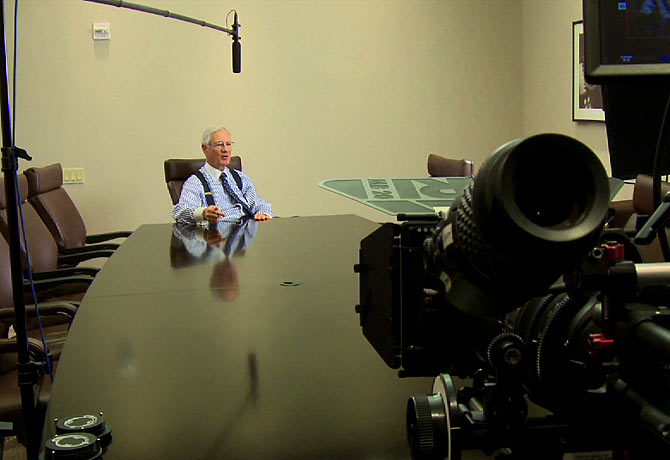
Jeffrey Lane, Vice Chairman Lehman Brothers from 2003-2007, in Inside Job
(2 of 2)
Some of these wizards — Charles Morris, author of the 2007 book The Trillion Dollar Meltdown, and Fortune columnist Allan Sloan — saw the collapse coming and warned against it. In 2005, at a conference honoring Fed Chairman Alan Greenspan, University of Chicago economics prof Raghuram Rajan delivered a paper entitled "Has Financial Development Made the World Riskier?" and was chastised for his pessimism by Harvard President Lawrence Summers, who is now Barack Obama's chief economic adviser. Neither Summers nor Greenspan — nor, for that matter, Ben Bernanke, Robert Rubin, Henry Paulson, Timothy Geithner or any other architects of the bubble-and-bust economy — agreed to be interviewed for the film.
The few corporate apologists who dared to go on screen probably wish they hadn't. One is Fredric Mishkin, a Fed member from 2006 to 2008 who now teaches at Columbia University's Business School. Like some malefactor caught by Mike Wallace in his 60 Minutes prime, Mishkin stammers and wilts under Ferguson's increasing skepticism. ("Excuse me," the filmmaker says at one point, "you can't be serious.") Another squirming solon is Glenn Hubbard, Bush's chief economic adviser and now the Dean of Columbia Business School. Like the majority of the best and brightest, he ignored omens of a financial tsunami — and still pretends he's not all wet. As Ferguson's line of questioning becomes more pointed, Hubbard snaps, "You have two more minutes. Give it your best shot." But Hubbard has already shot himself in the foot. It will be interesting to see how this film affects his Deanship when it opens in the U.S. this fall.
In truth, one uncomfortable day in front of Ferguson's camera — or the implied embarrassment in refusing to answer for a career of misdeeds — is a minor inconvenience for men who earn vast sums sitting on boards, consulting and giving speeches at $100,000 a pop. You might condemn the bright kids who renounced science and medicine to make millions in the Wall Street game, and who charged millions more on their expense accounts for cocaine and prostitutes. No question, they were as trigger-happy as gunslingers, and as boastful of their portfolio size as porn studs. But they took their cue from the prevailing culture of excess: from their billionaire bosses with their private jets, from the rating agencies like Standard & Poor's and Moody's that kept awarding AAA ratings to the unstablest of firms, and from a Congress that overturned any laws that might stanch the money gush and protect the consumer. In the end, they didn't pay; we did, and got little back. (A wall of graffiti in the film reads: "Where's my f___in' bailout?")
The larger message of Inside Job is that American optimism — the engine, for two centuries and change, of our national expansion — can also have tragic consequences. The conquest of Iraq? A slam dunk. Gambling billions on risky mortgages? Not to worry — the housing market always goes up. Ignoring darker, more prescient scenarios, the smart guys in charge constructed faith-based policies that simply couldn't go wrong. In their myopia, they stumbled toward a precipice, and the rest of us fell off. Somehow, though, they stayed at the top. Instead of convictions and jail time, they got bigger government jobs, fatter paychecks in business, cushier sinecures in academe.
Michael Moore's Capitalism, completed last summer, painted a rosy view of the new Administration's response to the meltdown. A year later, that charitable judgment is hard to sustain. In its non-doctrinaire, subtly devastating fashion, Inside Job details how, in the Obama White House, Summers and Geithner and the same old boys are calling the shots of a recovery that has benefitted their cronies without enriching the average Joe. It's as if the pederast priests and their high-ranking apologists had taken over the Vatican.